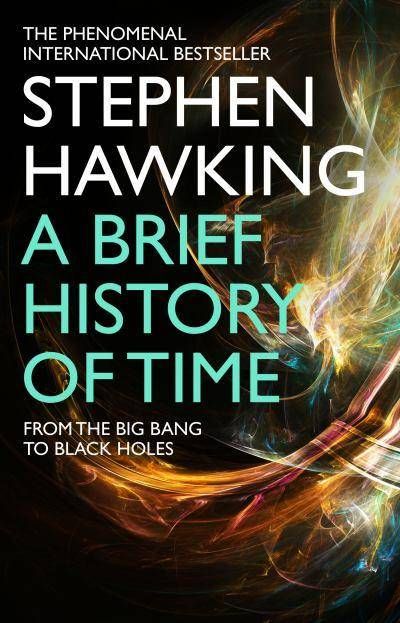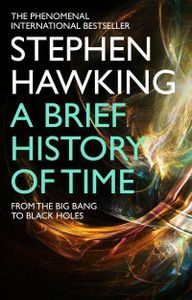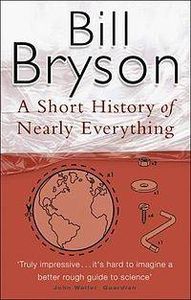
3 Books That Will Make You Smarter
We all have a few books that influenced us in one way or another, even a few that “changed our lives.” There are books that make us feel better about ourselves after reading them. And then there are books that just make you feel smarter after reading. They may even make you smarter.
Let’s start off with a little question for you word-types, to get the old juices flowing: what word begins with “he” and ends with “he” (but is not just “He”)? (The answer is at the bottom of the post).
Here are three books that I’m pretty sure can raise anyone’ IQ by a few points (or at the very last supply you with a few answers to Trivial Pursuit questions).
 1. A Brief History of Time by Stephen Hawking
1. A Brief History of Time by Stephen Hawking
A famous anecdote regarding this book is that Hawking was told that any equation in a book halves its sales, and so only one was included in the final version, E = mc². The book has sold about 10 million copies so far, and I bet Mr. Hawking is glad he didn’t add another. The book centers around our current knowledge of how the world we live in came to be, from a strictly scientific point of view, though standing on the shoulders of Newton and Einstein.
It is not an easy book, and you will have to keep your brain on at all times. It provided me with a few moments of epiphany as I read, and I attribute quite a bit of my devout atheism to it (see what I did there?). Note, however, that this is not an “atheist” book, it just happened to answer a few of my questions as I abandoned religion. Well, as far as I was able to follow it, for it is quite taxing on the old noggin.
Overall, reading this book will make you appreciate the complexity of the universe. It will also put you in awe of Hawking’s intellect.
2. Gödel, Escher, Bach by Douglas Hofstadter
This is a really fun book. Parts of it seem slightly dated (it came out in 1979), but overall it is a mind-stretcher. The author claims that it is “about how cognition and thinking emerge from well-hidden neurological mechanisms.” Still with me? It deals with “strange loops” and things that just don’t make sense but you can’t say why, such as me saying that all book bloggers are liars. The next sentence is false. The previous sentence is true.
In the book we are introduced to Hofstadter’s Law: It always takes longer than you expect, even when you take into account Hofstadter’s Law. The thing to note is that the law refers to itself in its definition. Confused yet?
The author spends much of the book referring to self-referential systems and playing with ideas. The names in the title, Gödel, Escher and Bach are those of men who were each a genius of sorts. Gödel was a mathematician, Escher is an artist who made wonderful drawings of which you have seen many, and Bach wrote some music.
He also plays word tricks, like this: “Is not a complete sentence” is not a complete sentence. The previous sentence is, of course, a complete sentence but it plays a little game of repetition. Hofstadter makes claims about the nature of the world and does so in a way that is a joy to read (if you can follow along). At the end of each chapter he writes little fables with the Greek warrior Achilles, a tortoise, a hare and a few of their friends, where they speak in paradoxes.
I fear I am unable to do this book and its subject matter justice, but it is a very hard book to describe. It’s a fun book, but a complicated one. It will also make you smarter.
 3. A Short History of Nearly Everything by Bill Bryson
3. A Short History of Nearly Everything by Bill Bryson
This was the best book I read back in 2007. A true treasure of popular science, it tells the story of how we know the things we know (the earth is round, animals evolve, plate tectonics) and also presents us with the scientists who made these discoveries. The scientists do not necessarily come off well; Newton, for example, was a real dick.
The reason this book is so good is that it tells the complete story of each of the scientific discoveries, including all the people involved and anecdotes relevant to the discovery. It is the most fun I’ve had reading a non-fiction book. I highly recommend it as a present for anyone who is curious about why things around us are the way they are. And if you were eager at first during science class but quickly got bored with the list of facts and boring memorization of dates and things discovered… this book is for you.
An amazon reviewer describes it like this: “I picked this one up expecting “good”. Instead, I got one of the most delightful reading experiences in science that I have ever had. What a wonderful surprise.”
And the answer to the question posed at the beginning of this post (I just referred to this post in the post itself):
Headache.
If you had read these books you would have been able to figure that out. So go get these books!
____________________________
Sign up for our newsletter to have the best of Book Riot delivered straight to your inbox every two weeks. No spam. We promise.
To keep up with Book Riot on a daily basis, follow us on Twitter, like us on Facebook, , and subscribe to the Book Riot podcast in iTunes or via RSS. So much bookish goodness–all day, every day.



 1. A Brief History of Time by Stephen Hawking
1. A Brief History of Time by Stephen Hawking 3. A Short History of Nearly Everything by Bill Bryson
3. A Short History of Nearly Everything by Bill Bryson







